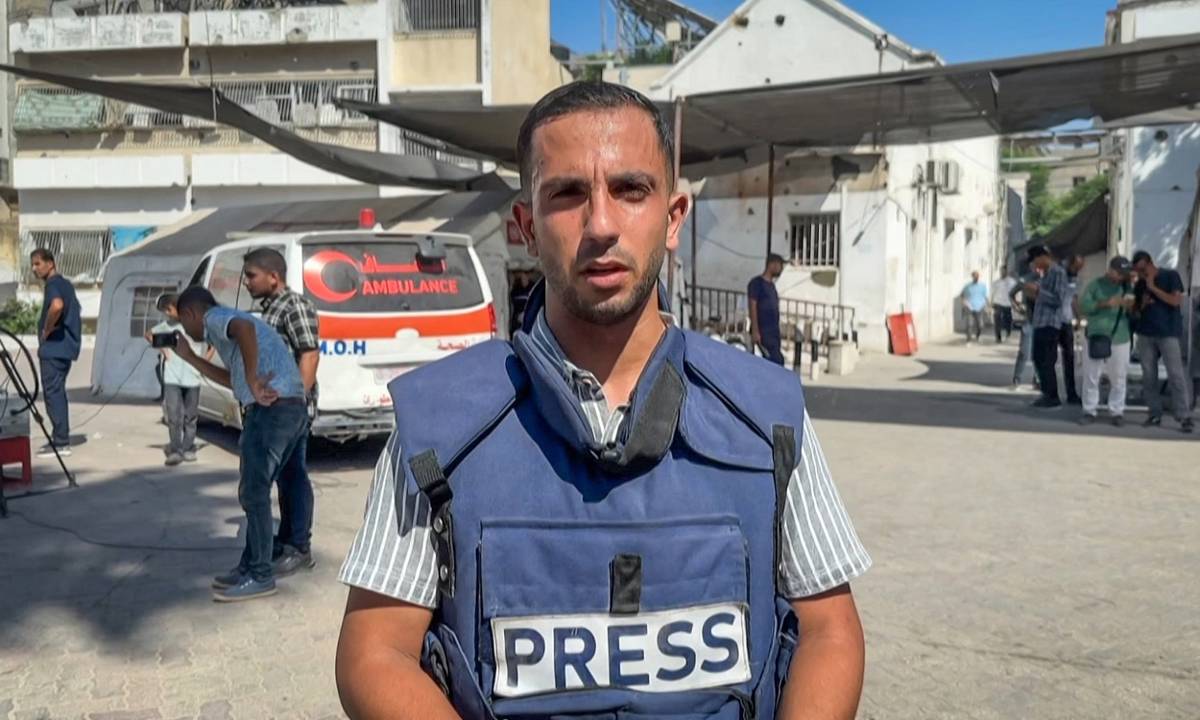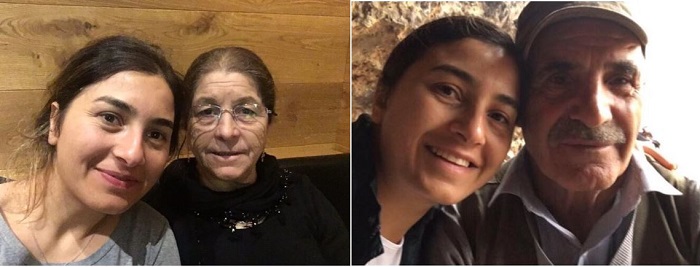Since 7 October, six journalists had been working under harrowing conditions to expose the massacre in Gaza. On 10 August, they were killed inside a media tent in a deliberate Israeli airstrike, which Israel confirmed had been planned. While the world remains silent, Gaza’s journalists continue their mission—to be the voice of the voiceless and to bear witness to the truth, no matter the cost.
Al Jazeera correspondent Anas al-Sharif stood before the camera to describe the grim reality of children so starved that they could no longer move, too weak even to cry and dying in silence under Israel’s deadly blockade in Gaza. During the live broadcast, when a woman next to Anas collapsed from starvation, he struggled to hold himself together and covered his face with his hands so viewers could not see his tears. A man nearby called out to him: “Keep going, Anas. Don’t stop. You are our voice.” He knew that if Anas gave in to tears, if he put down the microphone, if he walked away from the camera, their suffering —and their voices— would become even less likely to be heard.
A few days after that broadcast, Anas al-Sharif reflected on what had happened: “Honestly, faced with the horror of what I was seeing, I couldn’t hold back. But then, right beside me, I heard the voice of someone writhing in hunger: ‘Keep going, Anas. Don’t stop. You are our voice.’ That’s truly all I care about—to make the world hear the voices of people in Gaza, trapped under siege, condemned to hunger, and abandoned in their despair.”
And he was doing just that. Journalist Anas al-Sharif was telling the world that people in Gaza were being killed by bombs, deliberately targeted and massacred, starved and deprived of water, their hospitals destroyed—that Israel was committing acts that should never happen even in war, acts amounting to war crimes. For 637 days, he had witnessed hunger and suffering every single day, lived through it himself, and then stood before the camera to tell Gaza’s story. He was doing his job. Upholding the core principle of journalism—to be the voice of the voiceless—was both his moral and professional duty. He was only 28 years old, a father of two children he had hardly seen for nearly two years because of his work. Determined and hardworking, he was a fellow Palestinian journalist of mine who told the world from the midst of scenes most people could not even bear to look at: “Look, this is what happened.” He was a television correspondent, a journalist. In an era when even reporters are being targeted, he was a Palestinian journalist.
Israel killed six journalists
On the night of August 10, Israel deliberately targeted, planned, and intentionally bombed Al Jazeera correspondent Anas al-Sharif and five of his colleagues who were staying in a media tent in front of Gaza’s Shifa Hospital, killing them. Although laws exist to safeguard journalists even in war, they were largely disregarded except for a few half-hearted statements. We knew Anas al-Sharif from what we saw on camera, but the colleagues working alongside him— Mohammed Qreiqeh, Ibrahim Zaher, Muhammed Noufal, Musab al-Sharif, and Mohammed al-Khalidi—known as “the ones in the kitchen,” were helping raise Gaza’s voice. They too were young and honorable colleagues. Qreiqeh, a former Middle East Eye correspondent working for Al Jazeera, was reporting on the crimes committed by Israel. Zaher, Noufal, al-Sharif, and al-Khalidi were cameramen and photojournalists. The Al Jazeera team had been staying in the media tent.
According to the Gaza government’s media office, together with Anas al-Sharif and his colleagues, Israel has killed 238 Palestinian journalists in Gaza since the war started. The Committee to Protect Journalists (CPJ) reports that 180 Palestinian journalists have been killed in the past two years alone—far more than the total number of journalists killed worldwide over the past three years. Amnesty International states, ‘No conflict in modern history has seen a higher number of journalists killed than Israel’s genocide against Palestinians in the Gaza Strip,’ adding, ‘Starved and exhausted, they continued to bravely report from the frontlines, despite death threats and immense grief.’
Will this war end while we are still alive?
Middle East Eye journalist Maha Hussaini recounted the following after the killing of her colleagues: “Two days before the war, Anas al-Sharif called me and asked, ‘My spouse and I are planning to eat out—any restaurant you’d recommend?’ Coincidentally, I was also going to a restaurant with my spouse. He smiled and said, ‘Perfect.’ That was the last meal we shared together on the Gaza coast. We felt our grief without needing words. When our home was bombed, he was the first to call.” Regarding the slain photojournalist Mohammed Qreiqeh, she wrote: “I usually worked alongside Qreiqeh. He would always say, ‘I won’t live long.’ The death of his mother in Israel’s April 2024 attack on Al-Shifa Hospital deeply affected him. Whenever we went out on assignment, he would ask, ‘Do you think we’ll make it back?’ and then smile.”
“Anas, on the other hand, always tried to help everyone. Once, he saw an elderly woman injured. He finished the report he was sending to Al Jazeera and stayed by her side until morning. Off-camera, he would say, ‘God, I am so hungry, I can barely stand.’ He would often ask, ‘Do you think this war will end while we are still alive?’ and his friends would answer, ‘You’re like a cat—you have nine lives.’
Sadly, no one truly has nine lives — and Anas al-Sharif had staked his one and only life on journalism. Just like Shireen Abu Akleh, the Al Jazeera correspondent who was deliberately shot and killed by Israeli soldiers while reporting from Jenin camp on May 11, 2022. Or like Nermin Nasr Haboush, killed on December 30, 2023. They have already gone down in history as slain witnesses, journalists silenced by violence. They refused to abandon their homeland, determined to tell the truth. While foreign media withdrew from Gaza for safety reasons, they stayed, in the heart of an even deeper storm of violence. Just a few days ago, AFP underscored the gravity of the situation, saying: “We have lost correspondents in war before, but never have we lost one to starvation.” Anas al-Sharif and his colleagues had risked both hunger and death. Perhaps it was precisely because they dared to take these risks — because they gave Gaza a voice — that Anas ended up on Israel’s “kill list.” Israel labeled him as having ties to Hamas, branded him a terrorist, and threatened both him and his family. Apart from statements from journalist organizations, there was little outrage. Like journalists everywhere, he had no security — in fact, even less than most. When his 90-year-old father was killed by Israel, he must have known his turn was coming. He buried his father and went back to work. That deeply moving testament later posted on his social media — he must have written it then.
A Life Lived Through War
Anas al-Sharif bore witness to an era, to massacres, to genocide — with his entire life. He was born in Gaza’s Jabalia refugee camp in 1996. He was three when the Second Intifada erupted, ten when Israel first imposed its blockade on Gaza, twelve when the 2008 war began, and eighteen during the 2014 offensive. His life unfolded entirely against the backdrop of war. He studied in schools run by UNRWA and the Palestinian Ministry of Education, and in 2014 enrolled in Al-Aqsa University’s Radio and Television Department, graduating in 2018.
Anas began his career as a volunteer at North Media Network before joining Al Jazeera. For 22 months under a crushing blockade, there wasn’t a single major story he didn’t cover — and most were tragedies. His brightest moment came when a ceasefire was announced: he removed his bulletproof vest marked “PRESS” to deliver the news. For a brief moment, there was hope — that he would embrace his young daughter Sham, his son Salah, his wife Bayan, and his mother again.
Anas knew he was carrying forward the mission of colleagues who had been killed before him. Unfazed by bombings and attacks, he kept bearing witness — telling the world Gaza’s tragic story. He reported on the deaths of close friends, chronicled the killing of children, documented the horrors inside hospitals, buried loved ones — and then returned to the camera to be Gaza’s voice once more.
“Do not forget Gaza… and do not forget me in your prayers”
Sharif likely sensed what fate awaited him. In his will, he wrote: "If these words reach you, know that Israel has succeeded in killing me and silencing my voice... I entrust you with Palestine—the jewel in the crown of the Muslim world, the heartbeat of every free person in this world. I entrust you with its people, with its wronged and innocent children who never had the time to dream or live in safety and peace. Their pure bodies were crushed under thousands of tons of Israeli bombs and missiles, torn apart and scattered across the walls. I urge you not to let chains silence you, nor borders restrain you. Be bridges toward the liberation of the land and its people, until the sun of dignity and freedom rises over our stolen homeland. I entrust you to take care of my family. I entrust you with my beloved daughter Sham, the light of my eyes, whom I never got the chance to watch grow up as I had dreamed. I entrust you with my dear son Salah, whom I had wished to support and accompany through life until he grew strong enough to carry my burden and continue the mission. I entrust you with my beloved mother, whose blessed prayers brought me to where I am, whose supplications were my fortress and whose light guided my path. I pray that Allah grants her strength and rewards her on my behalf with the best of rewards. I also entrust you with my lifelong companion, my beloved wife, Bayan, from whom the war separated me for many long days and months. Yet she remained faithful to our bond, steadfast as the trunk of an olive tree that does not bend—patient, trusting in Allah, and carrying the responsibility in my absence with all her strength and faith. Forgive me if I have fallen short, and pray for me with mercy, for I kept my promise and never changed or betrayed it. Do not forget Gaza… And do not forget me in your sincere prayers for forgiveness and acceptance.”
Beloved Anas, cherished colleague, I may not be able to be there for your family, but I will honor and carry forward your journalism.
(Published Agos newspaper, August 14, 2025)
(Transation: Bade Başer)





